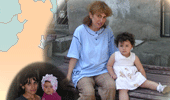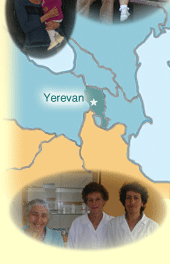
Health sector reform, with an emphasis on improving primary-level reproductive health (RH) care, was the focus of PRIME II’s work in Armenia. The country’s hospital-based, highly specialized health care system is slowly being replaced with more responsive and effective primary care, and PRIME assisted the Ministry of Health (MOH) to guide the system toward client-focused service delivery. PRIME concentrated on building national capacity through updating policies and guidelines and improving training and human resources, and on demonstrating new models of enhanced service delivery in targeted primary care facilities in Lori, one of Armenia’s most populous provinces.
PRIME II’s Armenia program encompassed four integrated components:
Improving the Performance of Rural Facilities
and Providers
Using the Performance Improvement (PI) approach, PRIME II implemented a series of interventions to expand the role of nurses and midwives in maternal and infant care in 60 ambulatories and health posts in Lori. An eight-module blended learning program including supervised clinical practice was designed to enable providers to monitor healthy pregnant women, educate communities on danger signs in pregnancy, and counsel postpartum women on the benefits of exclusive breastfeeding and use of modern contraceptive methods. Through a partnership between PRIME II and Management Sciences for Health, the supervisors of these providers underwent training in supportive supervision and a monthly monitoring system to encourage them to offer feedback and identify and solve performance problems. With Save the Children, PRIME also carried out a community-based activity using the Integrating Consumer Perspectives (ICP) approach to strengthen partnerships between communities and providers. In addition, PRIME identified and facilitated opportunities to upgrade working conditions with essential equipment at the target health posts, many of which lacked electricity and running water.
Key Results: A final evaluation comparing providers in intervention facilities with providers at control facilities showed mean percentages of prenatal care tasks successfully completed improving from 37% at baseline to 69% for providers benefiting from the intervention (n=86 baseline, n=60 final evaluation). Control group providers (n=127 baseline, n=34 final evaluation) also improved but to a much lesser degree: from 41.5% at baseline to 47%.
Monitors observing supervisors’ performance during 82 visits documented that supervisors created a supportive environment 94% of the time, gave feedback to the supervisee in 89% of visits, and coached supervisees to develop skills during 84.5% of visits. Average scores on a basic tools inventory at the 60 intervention facilities rose from 33% at baseline to 71% at final evaluation. The evaluation also showed that client visits and client satisfaction increased at higher rates in the intervention area.
Integrated Management of Sexually
Transmitted Infections
Realizing that people with a history of sexually transmitted infections (STIs) are up to ten times more likely to become infected with HIV/AIDS, the government of Armenia and PRIME II worked together to expand access to quality STI services by integrating STI prevention and management into primary health care. Over a 12-month period, the project addressed needs identified during an initial performance needs assessment of 15 primary care physicians in rural Lori, and worked to upgrade service delivery guidelines for STIs including appropriate use of syndromic management, an important approach in rural areas where laboratory screening may be expensive or unavailable.
Key Results: The project began by revising national policies and protocols to emphasize updated practices in syndromic management of STIs. A training program increased the knowledge scores of 60 physicians in integrated management of STIs by 23%. The physicians were supported by follow-up visits from monitors prepared to assist them in overcoming challenges in applying their new learning.
Strengthening Family Medicine Training
As part of health reform, the government of Armenia established a new cadre of family physicians and created family medicine departments at Yerevan State Medical School and the National Institute of Health. In 2003, PRIME II began a program to build the capacity of the two institutions to prepare and support family physicians in basic RH services. A performance needs assessment of 20 facilities in Lori found family physicians’ performance lower than obstetricians and internists in all areas of RH; the family physicians themselves reported that they felt unprepared to deliver basic RH services.
Key Results: PRIME II assisted the schools in developing a field-tested, competency-based training program, strengthening the skills acquisition component, and preparing a pool of qualified and experienced trainers on the family medicine faculty.
Improving Provider Response to Violence
against Women
Using PI principles, PRIME II designed a demonstration project to improve the ability of primary providers to screen, educate, treat and refer women who have experienced gender-based violence. Implemented at a polyclinic in Yerevan, the model also helps providers work collaboratively with community-based agencies that serve women through telephone hotlines, counseling, legal advice and domestic violence shelters.
Key Results: Providers trained in skills related to violence against women (VAW) scored 5.23 times higher than untrained providers on skills tests. Clients responded favorably to the integration of VAW in RH activities and acted on referrals made by the polyclinic. The project influenced national awareness of VAW as a public health issue, and contributed to health policy and strategies that recognize VAW as a factor in Armenian women’s and children’s health and well-being.
Armenia Country Documents:
Improving Access to and Quality of Reproductive and Child Health Care (National Forum, September 2002)
Violence Against Women as a Public Health Concern (National Meeting, April-May 2003)
A Directory of Organizations Offering Services in Gender-Based Violence (August 2003)

|











